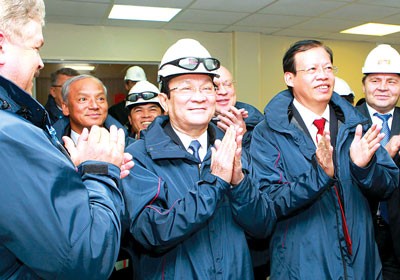Vietnamese President visits Nenetskiy autonomous region
(VOVworld) - President Truong Tan Sang yesterday visited Naryan-mar, the capital city of the Nenetskiy Autonomous Region in Russia. In Naaryan-mar, where nearly 20,000 Russians live, President Sang attended a ceremony celebrating the first oil flows from Khosedayusskoye, an oil field operated by the RusVietpetro joint venture. He also attended a ceremony to present the Labour Order, third class, to the joint venture’s units and individuals with outstanding achievements.

President Trương Tấn Sang celebrates the first oil flows from Khosedayusskoye, an oil field operated by the RusVietpetro joint venture. (Photo: VNA)
|
Since it was set up nearly two years ago, RusVietpetro has exploited more than 1.5 million tonnes of oil per year, setting a new record in oil and gas exploration and production in the northern region of Russia. Addressing the ceremony, President Sang praised efforts made by the joint venture’s engineers and staff to contribute to the Vietnamese-Russian comprehensive cooperation. Sang said: "The joint venture RusVietpetro is one of the most successful projects of Vietnamese-Russian cooperation. This is a lively symbol of the strategic partnership between the 2 countries, highlighting a significant step forward in the development of cooperation in oil and gas for the two countries. May this relationship be further consolidated and developed."
The same day, the Vietnamese President met with Nenetskiy Governor I.G. Fedorov, who said the oil field is the result not only of business cooperation but also of the tradition of friendly relations between the two countries. Sang lauded the cooperation between Vietnamese localities and the Nenetskiy Autonomous Region, saying that this plays an important role in strengthening Vietnam-Russia relations, as built by the two countries’ leaders and peoples for decades. He said he hopes the Vietnamese and Russian localities will increase the exchange of delegations and create effective plans to implement socio-economic programmes that will deepen their comprehensive strategic partnership.